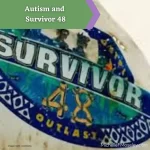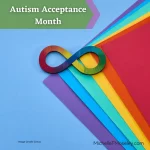Neurodivergent-Affirming ADHD/Autism Assessments for Adults
Providing in-depth assessments for adults in NC who are curious about their unique brain functioning
You’ve Always Felt “A Little Different” – Like You Don’t Quite Fit Anywhere
Completing a neurodivergent-affirming assessment can help you understand more about yourself, the way your brain works, and how to better get your needs met in all areas of life.

Sometimes it feels like everyone else was given the instruction manual to life and you missed out. You feel like you struggle more than others with social interactions. Maybe you find yourself exhausted by small talk or it seems like you just can’t quite get your point across when communicating.
You might find yourself struggling to complete (or even begin) tasks, even those that you actually want to do. You’re forgetting important details and have a general sense of overwhelm about life.
You often feel like you’re performing or wearing a mask. You want to understand how your brain works and how you can fully engage in the world in ways that support your struggles and allow your unique abilities to shine.

Imagine a Life Built Around the Passions and Connections that Bring You Joy
The first step to having this life is understanding your unique brain, ways of connecting with others, and needs. Taking part in a neuro-affirming assessment can guide you on this journey.
Understanding your natural rhythms can help you make decisions about how to spend your time and where to focus your energy. You can have more fulfilling interactions with others, relationships where you feel freedom to take off the mask. You can feel more confident in communicating your needs and boundaries after learning more about your own unique neurotype.
Completing the neurodivergent-affirming assessment process and reviewing the results can feel like being given a manual that is all about you. It’s not the general life instruction guide others seem to have, but your own personalized version!
Some Helpful Vocabulary
Neurotype – the way a person’s brain learns, communicates, and develops
Neurodivergent – having a brain that works differently than what is considered “typical” within a culture. This includes ADHD and Autism, as well as many other types of brain differences.
Neurodivergent-affirming / Neuro-affirming – an approach to therapy, assessments, and life that recognizing and values the unique strengths, needs, and preferences of individuals of all neurotypes
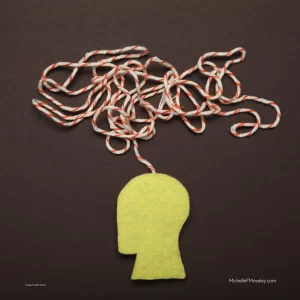

How Do Neuro-Affirming Assessments Work?
An individually tailored process designed to help you better understand your way of being in the world, always considering your specific needs and preferences based on your neurotype.
A neurodivergent-affirming assessment is an opportunity for you to take off the mask (possibly even becoming aware that you’ve been wearing one to begin with). You will complete a variety of formal assessment questionnaires and a structured interview over the process of multiple sessions to gather information about your unique experience.
The specific format, number and length of sessions, and delivery of results can be modified based on your needs and preferences. A pre-assessment consultation is included to ensure the process meets your needs.
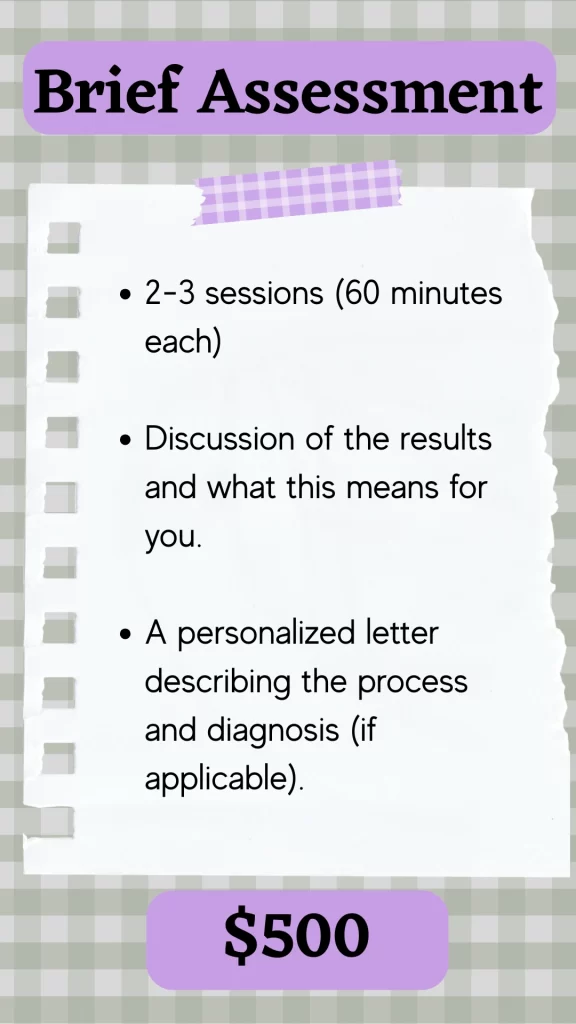
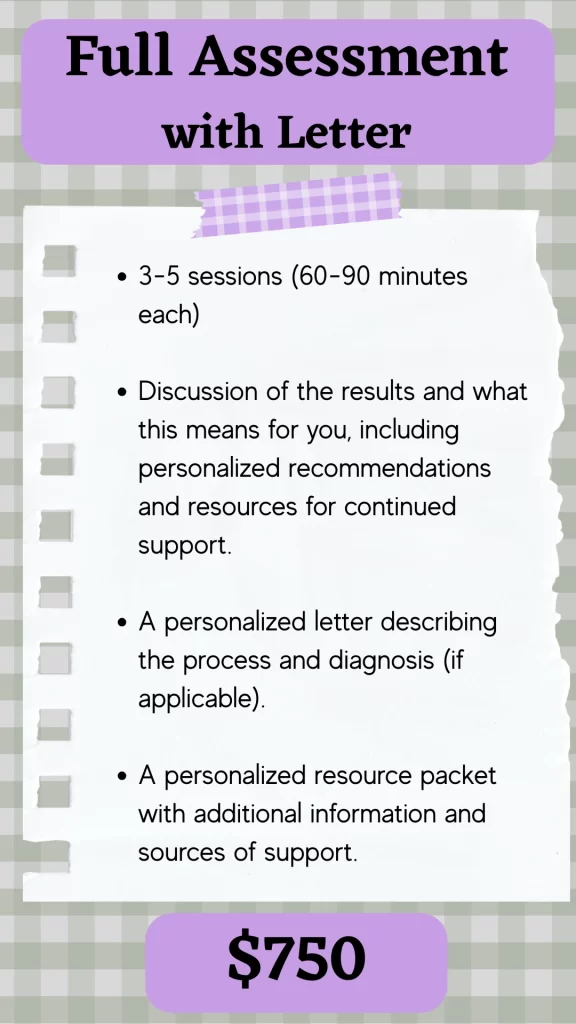
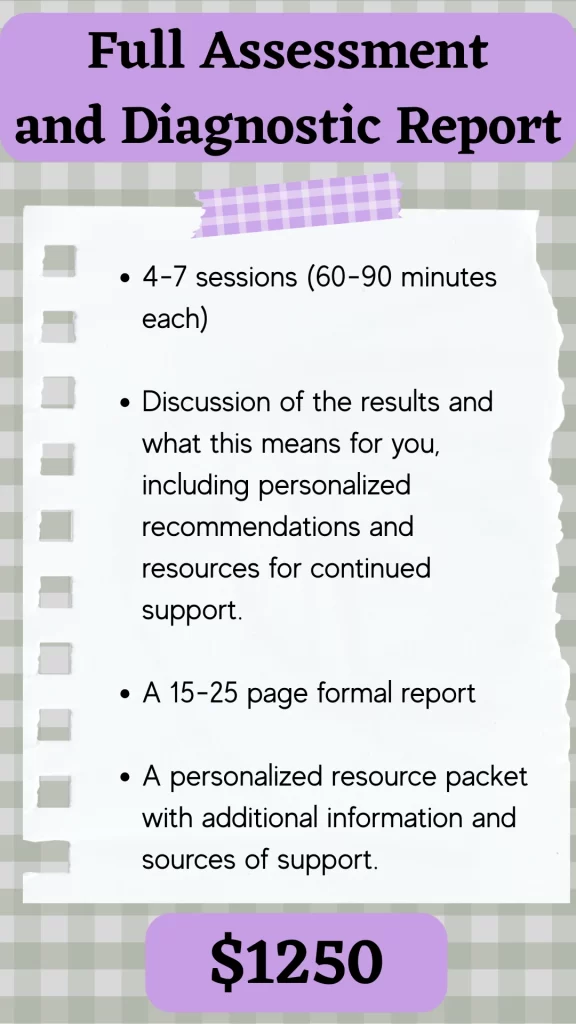
Brief Assessment – $500
- 2-3 sessions (60 minutes each) – Includes a short clinical interview and the completion of 8-10 assessment measures, depending on your individual needs.
- Discussion of the results and what they mean for you. This will include any diagnosis information that may apply.
- A personalized letter describing the process and diagnosis (if applicable). You may choose to use this in sharing information with other medical or mental health providers or seeking accommodations to support your unique neurotype.
Full Assessment (with Letter) – $750
- 3-5 sessions (60-90 minutes each) – Includes a full clinical interview and the completion of 15-20 assessment measures, depending on your individual needs.
- Discussion of the results and what they mean for you. This will include any diagnosis information that may apply, as well as personalized recommendations and resources for continued support.
- A personalized letter describing the process and diagnosis (if applicable).
- A personalized resource packet with additional information and sources of support based on your results.
Full Assessment and Diagnostic Report – $1250
- 4-7 sessions (60-90 minutes each) – Includes a full clinical interview and the completion of 15-20 assessment measures, depending on your individual needs.
- Discussion of the results and what they mean for you. This will include any diagnosis information that may apply, as well as personalized recommendations and resources for continued support.
- A 15-25 page formal report covering the results of each assessment measure, the diagnostic information, official diagnosis (if applicable), and recommendations for continued support.
- A personalized resource packet with additional information and sources of support based on your results.
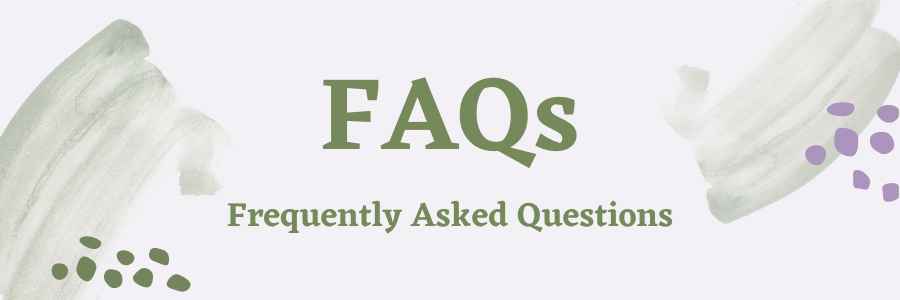
What is a Neurodivergent-Affirming (neuro-affirming) Assessment?
A neurodivergent-affirming, or neuro-affirming, assessment is a structured process where information is gathered about an individual’s development, mental health, and brain function in order to help the individual better understand areas where they may struggle and how to access resources to meet their unique needs.
This process is neuro-affirming because it allows for flexibility to best meet the needs and preferences of various neurotypes. This flexibility includes, but is not limited to, the number and length of sessions, the specific content covered, the delivery of the process, and the ability for individuals to have comfort items available during the process.
Why do your Neuro-Affirming Assessments include both ADHD and Autism?
ADHD and Autism are 2 of the most common types of neurodivergences that impact people’s lives. The most recent research has shown a large overlap (potentially up to 83%) in the prevalence of ADHD and Autism, meaning individuals who are diagnosed with one either ADHD or Autism are very likely to be impacted by the other one. By including assessment measures for both ADHD and Autism, as well as a few other types of neurodivergence, my neuro-affirming assessments are able to provide a more thorough evaluation and greater personalization in the results and suggested resources.
Who can provide a Neuro-Affirming Assessment?
In North Carolina, an LCMHC (Licensed Clinical Mental Health Counselor) who has appropriate training and expertise in neurodivergence, ADHD, Autism, and assessment measures is able to use diagnostic procedures (i.e. the neuro-affirming assessment process) to evaluate and treat mental disorders and other conditions. Learn more about this here
I have completed all the requirements to be independently licensed as a Licensed Clinical Mental Health Counselor, and have been in practice for almost 10 years. I have completed an additional 30+ hours of continuing education focused on providing assessments, as well as 100+ hours of continuing education in topics related to neurodivergent-affirming care.
**Note about language: I do not prefer the terminology of “mental disorders and other conditions” as a way to describe the various human neurotypes, but I have chosen to use it here because that is the language of the official state statute relating to the question.**
How can the results of a Neurodivergent-Affirming Assessment be used?
Many people choose to complete the neuro-affirming assessment process in order to better understand the way their brain functions and how they can best support their own needs.
In North Carolina, the results of a neuro-affirming assessment can often be used to make accommodation requests in college or work settings. Physicians may also accept the results of these assessments when considering medication for things like ADHD. You can always discuss your specific situation with me prior to engaging in the assessment process to help ensure this process can be used to meet your needs.
In some cases, specific organizations may require evaluation by a psychologist or by someone within their organization in order to accept the results. Instances where the results of a neuro-affirming assessment may NOT be accepted include:
- Applications for Social Security Disability
- Applications for support and/or accommodations through federal and state agencies. This includes K-12 public schools.
- Some physicians for the prescription of medications, particularly stimulant medications often utilized for the treatment of ADHD. Discussion with your provider can help clarify their requirements for diagnosis.
Can I use my health insurance to cover the cost of a Neuro-Affirming Assessment?
I provide all services on a self-pay basis and do not interact with any insurance companies. This means that your assessment outcomes and any related diagnostic information is fully confidential. When insurance is utilized to cover these services, any diagnosis becomes part of your medical record, which your insurance company and any current/future providers have access to.
By providing assessments without the involvement of insurance companies, you control if, when, and how your information is shared. This can provide an additional level of safety in the context of the removal of inclusion initiatives and discussions of “registries” for certain diagnoses.
I do provide payment plan options for neuro-affirming assessments. Please let me know if you have any additional questions about this.
Will I receive a diagnosis after a Neuro-Affirming Assessment? How will any diagnosis information be used?
It is impossible to know for certain, prior to completing the assessment process, whether or not a diagnosis will be given. The assessment process is designed to help determine if a specific diagnosis fits your experience. The results of the neuro-affirming assessment will include information about any diagnoses that apply, as well as a discussion about how you might want to use these diagnoses.
Because I provide these neuro-affirming assessments without the involvement of insurance, you have full autonomy regarding if / how any diagnosis is shared. This may be helpful to know in light of discussions regarding “autism registries” and the like. You will receive either a letter or multi-page report, depending on the type of assessment you complete, that covers the results and any applicable diagnostic information. You can choose if you share this information, and with whom.
How do I know if a Neurodivergent-Affirming Assessment is right for me?
You likely found this page because you’ve been wondering about the way you experience the world. Whether it’s been a lifetime of feeling different or a more recent recognition that you’re struggling in life more than you’d like, you want to learn more about yourself and figure out how to access helpful resources. A neuro-affirming assessment may be exactly what you’re looking for. Complete this form to get started with a free, 15-minute virtual consultation for a Neurodivergent-Affirming Assessment.
Blog Posts Related to Neurodivergence
Get Started With a Neuro-Affirming Assessment
Complete this form to get started with a free, virtual consultation to discuss if an ADHD/Autism assessment can help meet your needs.

